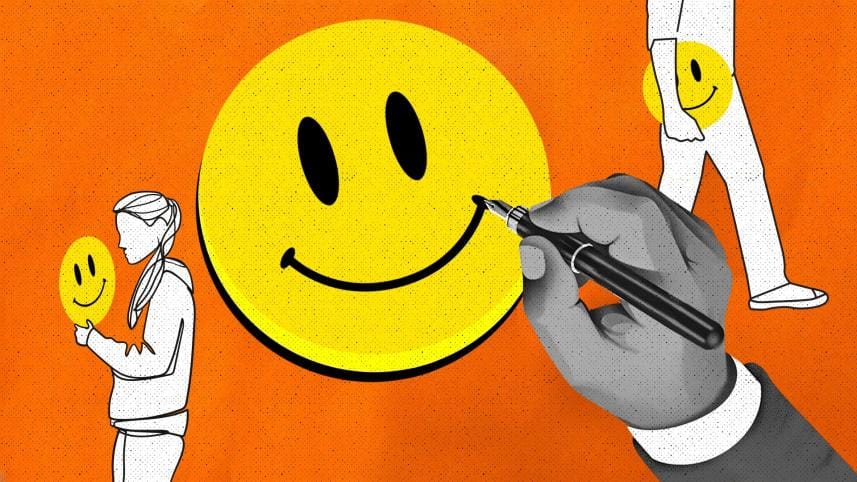Happiness? In this economy?

Today is the International Day of Happiness, a delightful concept for those who don't live in Bangladesh. Somewhere in Scandinavia, a group of people are probably celebrating by sipping honey oat milk lattes in their efficiently designed apartments, basking in their government-mandated work-life balance. Meanwhile, in Bangladesh, we celebrate happiness the way we celebrate rain—by watching it happen somewhere outside.
Let's start with the obvious question: who exactly in Bangladesh is happy? Is it the rickshaw puller who wakes up at dawn, dodges death at every intersection, and earns just enough to afford a packet of puffed rice and some existential dread? Or is it the corporate employee stuck in an overpriced Uber, scrolling LinkedIn, while wondering if selling kidneys is still a viable business model? Perhaps it's the youth, those poor, unemployed souls who spent years getting degrees only to realise that their best shot at success involves either leaving the country or mastering the art of brown-nosing someone in power.
Ah, the hope for happiness—the one thing that encourages us to set aside our inflation-induced anxiety, and chronic disillusionment with governance to embrace positivity. This day, when Instagram talks about gratitude, well-being, and mental peace, those of us in Bangladesh stare at our egg prices like stock market traders and navigate potholes deep enough to warrant their own zip codes.
But let's be fair—happiness is a complicated thing. It's not about having a perfect life or a flawless country (if that were the case, no one on this planet would be happy). It's about resilience, adaptability, and the ability to laugh at absurdity even when it's all you have left. And if there's one thing Bangladeshis have mastered, it's the art of finding joy in chaos.
Take traffic, for instance. Objectively speaking, it's a waking nightmare, an urban purgatory where cars, rickshaws, and pedestrians battle for dominance in a never-ending game of "Who gets to move first?" But within that madness, there is something oddly unifying. Strangers stuck in the same jam exchange knowing glances, vendors weave through the gridlock selling everything from guavas to phone chargers, and somewhere, someone is making a TikTok about it. And doesn't that count for something? The ability to turn misery into content, suffering into shared experience?
And then there's our legendary air pollution—where stepping outside feels like lighting a cigarette but without the pleasure of actually smoking it. The way we collectively hack, cough, and pretend this is fine would make even the most hardened satirist weep. But here's the thing: we still show up. Students still make it to class, workers still report for duty, and dreamers still dare to imagine a Dhaka where the sky isn't an ominous shade of grey. If that isn't hope, what is?
Our economy—now that's a fun one. Officially, it's booming. In reality, a trip to the grocery store requires financial planning that would make an accountant sweat. But amidst the absurdity, people find ways to adapt. Small businesses are still hustling, garment workers are still keeping the country's biggest industry alive, and young entrepreneurs are creating digital startups that defy the odds. It's almost as if Bangladeshis refuse to be beaten down, no matter how much the system tries.
And then there's our so-called democracy. Yes, elections here are more predictable than BTV's programming lineup, but political engagement is at an all-time high. Students took to the streets demanding justice and have now moved on to politics.People are talking about accountability. And no matter how many laws are passed to keep opinions in check, people still find ways to say what they mean. If there's a silver lining, it's that the thirst for real change has never been stronger. The need for brighter futures is being thrived towards.
Despite everything—the air, the traffic, the economy, the politics—there is something about this country that refuses to be defeated. You see it in the way strangers help push a broken-down bus, in the laughter that echoes from roadside tea stalls, in the warmth of communities that come together in times of crisis. We complain, we rant, we meme our way through misery, but we never really stop hoping. We find small moments of joy in sipping coconut water on the side or the occasional fuchka-jhalmuri breaks from the hustle of corporate life.
And maybe that's what happiness looks like for us—not the absence of struggle, but the determination to find light even in the thickest of smog. A belief that things can get better. Because if there's one thing Bangladesh has proven over and over again, it's that no matter how many times we are knocked down, we always—always—get back up.
So, on this International Day of Happiness, let's celebrate the resilience, the stubborn optimism, and the relentless spirit that keeps this country going. If we can laugh through it all, maybe, just maybe, we'll be the ones who get the last laugh.
Barrister Noshin Nawal is an activist, feminist, and a columnist for The Daily Star. She can be reached at nawalnoshin1@gmail.com.
Views expressed in this article are the author's own.
Follow The Daily Star Opinion on Facebook for the latest opinions, commentaries and analyses by experts and professionals. To contribute your article or letter to The Daily Star Opinion, see our guidelines for submission.




 For all latest news, follow The Daily Star's Google News channel.
For all latest news, follow The Daily Star's Google News channel.
Comments